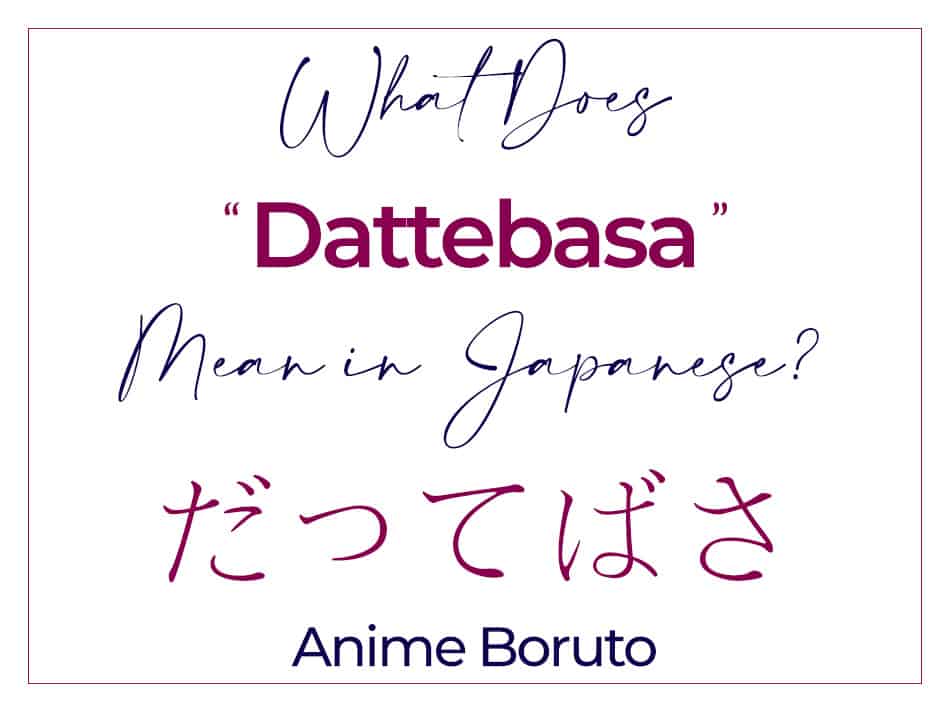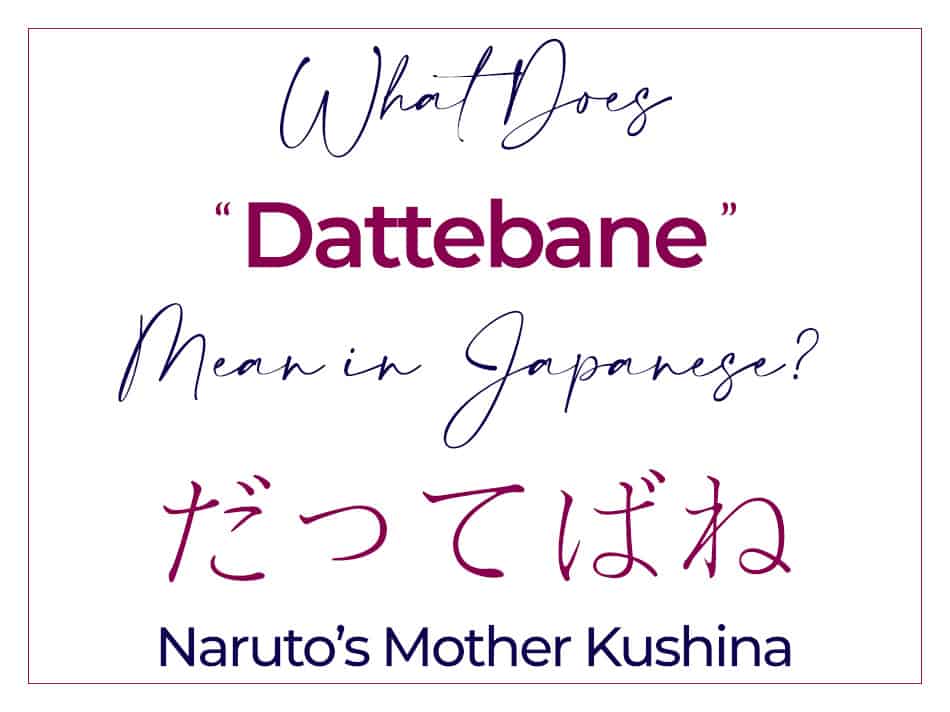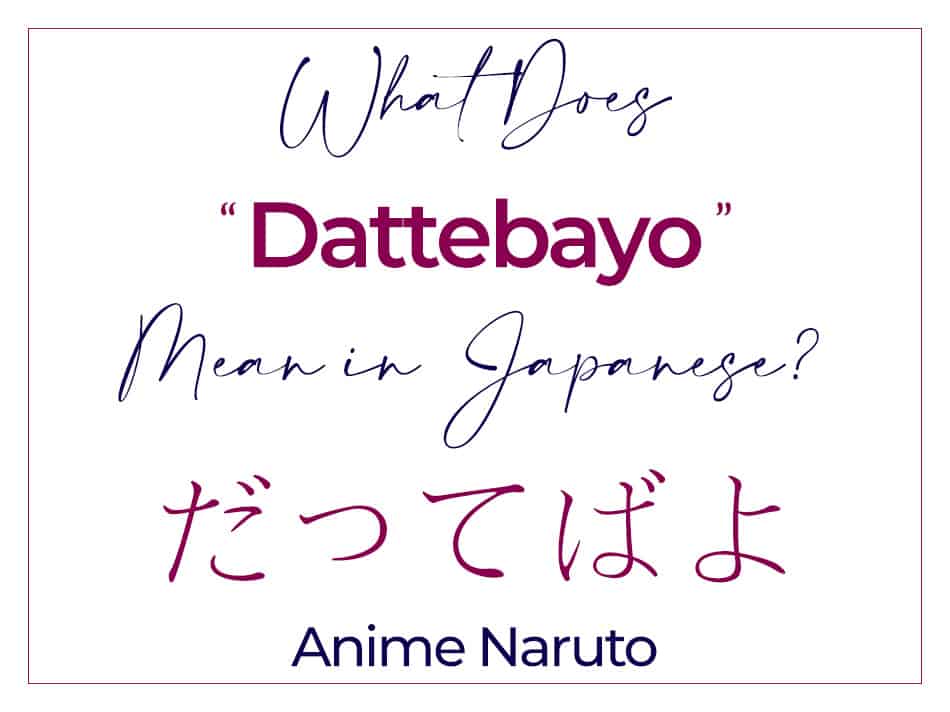Naruto is one of my favorite animes, so today I’m going to explain to you the real but slightly disappointing meaning behind his famous catchphrase “Dattebayo” (だってばよ). Since Boruto‘s “Dattebasa” (だってばさ) and Kushina‘s “Dattebane” (だってばね) are very similar I’m also going to cover what these two phrases mean. Let’s start with answering the question: What does “dattebayo” mean in Japanese?
Naruto’s “dattebayo” (だってばよ) is translated as “Believe it” but in Japanese, the phrase doesn’t have any meaning. Masashi Kishimoto, Naruto’s creator, confirmed that he invented the catchphrase to underline Naruto’s reckless character. The phrase makes Naruto sound childish but also full of energy.
Below I will go over the different parts the phrase “dattebayo” consists of and explain their meanings in detail. After that, you will find out why “dattebayo” is not a real Japanese word and I will tell you not only the meaning but also the differences between Boruto‘s “dattebasa“, Kushina‘s “dattebane“, and Naruto’s signature phrase.
The Meaning of “Dattebayo” in Japanese
Naruto’s signature phrase “dattebayo” (だってばよ) can be broken down in 3 parts. Da (だ) is the casual version of the copula desu (です), “tteba” (ってば) which is an informal expression that is used to reassure that what you are saying is true or to restate somehing you have said before, and yo (よ) is a sentence-ending particle that adds emphasis.
- da (だ) translates as “to be” but here it is added for grammar reasons
- tteba (ってば) can be translated as “I’m telling you” or “I told you“
- yo (よ) is a particle that is best translated as an exclamation mark “!“
While in English Naruto’s signature line is usually translated as “Believe it!” or “ya know“, there is acutally no correct or right translation for it because the phrase doesn’t have a real meaning in Japanese.
Dattebayo!
だってばよ!
Believe it!
Ya know!
The expression only changes the tone of voice and makes the speaker aka Naruto sound rather childish and a bit funky but also full of energy and determination. It is a very informal expression that matches Naruto’s slightly foolish but unwavering personality.
Rather than translating it the best way to express the meaning of “dattebayo” (だってばよ) in English is by changing your voice and trying to sound like a hyperactive child that speaks in a very enthusiastic way.
Even native speaker have trouble explaining the word “dattebayo” as you can see in this video:
Is Dattebayo a Real Japanese Word?
Naruto’s catchphrase “dattebayo” (だってばよ) is actually not a real Japanese word and in an interview, Masashi Kishimoto, the author, confirmed that he invented the phrase just for Naruto. However, “datteba” (だってば) is a real Japanese word or phrase that means “I’m telling you” or, “I told you“.
In the Japanese language, there are actually a lot of endings that can be added to a sentence to change its tone of voice. Desu (です) for example makes the sentence sound more polite, dayo (だよ) and daze (だぜ) add emphasis and force, while dane (だね) sounds softer and adds a feminine touch.
Sore ga ore no nindou dattebayo.
それが俺の忍道だってばよ。
That’s my way of the ninja, believe it! (naruto-style)Sore ga ore no nindou desu.
それが俺の忍道です。
That’s my way of the ninja (polite)Sore ga ore no nindou dayo.
それが俺の忍道だよ。
That’s my way of the ninja!! (stronger)Sore ga ore no nindou daze.
それが俺の忍道だぜ。
That’s my way of the ninja!!! (stronger, masculine)Sore ga ore no nindou dane.
それが俺の忍道だね。
That’s my way of the ninja, isn’t it? (softer, feminine)
In a similar way, you can add “datteba” (だってば) at the end of certain Japanese sentences to add emphasis that what you are saying is true. It is just like the English phrases “I’m telling you“, “I can tell you“, “I tell you“, or “I swear“.
Honto da yo! Tondan datteba!
ホントだよ!飛んだんだってば!
It’s true! We did fly, I swear.Zou dattan datteba!
像だったんだってば!
I’m telling you it was an elephant!
Another way you can translate “datteba” (だってば) is “I told you“. When you have been saying the same thing over and over again or when you have already explained something a hundred times you can add emphasis or express your frustration or annoyance by adding “datteba” at the end of your Japanese sentence.
Chigaun datteba!
違うんだってば!
I told you it’s wrong!Doko ni iku no?
どこに行くの?
Where are you going?
E? Shibuya datteba!
え?渋谷だってば!
Huh? I told you I’m going to Shibuya!
The only difference between “datteba” (だってば) and “dattebayo” (だってばよ) is the yo (よ) at the end. This is a so-called sentence-ending particle and it is real Japanese. You can think of it as an exclamation mark that is used to add emphasis. However, it is not considered natural or correct Japanese when you add the sentence-ending particle “yo” after “datteba”.
Why Does Naruto Always Say “Dattebayo” aka “Believe it”?
Naruto always says “Dattebayo” in Japanese and “Believe it!” or “ya know” in English because the author wanted to give him a unique signature phrase that will make him characteristic and underline his personality. This is something very common in anime and called “kimezerifu” (決め台詞) in Japanese.
Jotaro Kujo’s “Yare yare daze” and Jolyne Kujo’s “Yare yare dawa” from the anime Jojo’s Bizarre Adventure are other very famous signature phrases. Check out my linked blog post if you want to know what both catchphrases mean. Kaguya-sama‘s “O kawaii koto” is another good example.
Dattebasa – The Meaning of Boruto’s Catchphrase

“Dattebasa” (だってばさ) is translated as “Believe it!” or “ya know“, but in Japanese, it doesn’t have any meaning at all. Just like Naruto’s “Dattebayo” it is not a real word, but a catchphrase that was invented solely for Boruto. “Sa” is a sentence-ending particle that adds more emphasis than “yo”.
“Sa” is a sentence-ending particle that adds emphasis and makes Boruto’s signature phrase sound more forceful and confident”
Boruto’s “dattebasa” (だってばさ) originated from the real Japanese phrase “datteba” which means “I’m telling you” or “I told you” and the sentence-ending particle “sa” (さ). Since the particle only changes the tone of voice it is really hard to translate it into English. However, it adds a lot of emphasis and force and sounds rather masculine.
So when Boruto says “dattebasa” it makes him sound a bit childish, because it is incorrect Japanese, but also quite forceful or assertive.
Dattebane – The Meaning of Kushina Uzumaki’s Catchphrase

“Dattebane” is the catchphrase of Kushina Uzumaki, Naruto’s mother, that is translated as “you know“. However, it is not a real word and therefore doesn’t have any meaning in Japanese. The phrase makes Kushina sound childish, but also strong and feminine, since “ne” is a particle used by women.
“Ne” is a sentence-ending particle that adds softness and makes Kushina’s signature phrase sound more feminine.
Kushina’s signature phrase “dattebane” (だってばね) consists of “datteba” and the so-called sentence-ending particle “ne” (ね) which is often translated as “…, right?“, “…, isn’t it?“, or “…, don’t you agree?“. “Datteba” means “I’m telling you” or “I told you” and makes her sound confident and stronger, while “ne” adds softness and makes her sound more feminine.
So the catchphrase shows not only her strength and determination but also her feminine and motherly side.
Dattebayo vs Dattebasa vs Dattebane
“Dattebayo“, “Dattebasa“, and “Dattebane” have the same meaning in Japanese, but the different sentence-ending particles “yo“, “sa“, and “ne” add a different feeling to each phrase. “Sa” sounds slightly more masculine and adds more emphasis than “yo”, while “ne” sounds softer and more feminine.
Naruto: Dattebayo!
Translation: “Believe it!” or “Ya know!“
Tone of voice: childish and funkyBoruto: Dattebasa!
Translation: “Believe it!” or “Ya know!“
Tone of voice: childish and assertiveKushina: Dattebane!
Translation: “You know!“
Tone of voice: childish and feminine
The general idea behind the three extremely similar signature phrases is that the “verbal tic” is a family thing of the Uzumaki family that Naruto inherited from his mother Kushina and Boruto inherited from his father Naruto.


